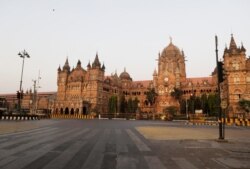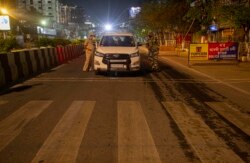India imposed a three-week nationwide lockdown from midnight on Tuesday, banning people from leaving their homes as it scrambled to break the chain of transmission of coronavirus in the country.
Affecting 1.3 billion people, it will be world’s largest lockdown announced since the coronavirus pandemic began its march in countries across the globe.
In a televised address, Prime Minister Narendra Modi told citizens that the lockdown should be viewed as a type of curfew. “The only way to save ourselves from coronavirus is if we don’t leave our homes; whatever happens, we stay at home,” he emphasized.
It was his second address to the nation in a week. Pointing out that the infection spreads like wildfire, the Indian leader warned: “If we don't handle these 21 days well, then our country, your family will go backwards by 21 years."
Citing health experts, Modi said, “India is today at such a stage, where our actions today will determine our ability to reduce the impact of this disaster.”
India’s clampdown comes hours after neighboring Nepal began a weeklong lockdown.
The stakes in combating coronavirus are high for South Asia, home to one-quarter of the world’s population, many of them poor. A decrepit health infrastructure has made these countries nervous about how they will cope if the number of cases begins to spiral.
India’s official count of 482 cases and nine deaths is widely believed to be an underestimate due to limited testing that has been carried out. Experts are also skeptical about official claims that there is no community transmission so far and warn that cases of coronavirus have begun spilling from big cities where it came via people who had traveled overseas into small towns.
Nepal has only reported two cases but fears the numbers could rise because thousands of migrant workers who work in India returned home in recent days.
Ahead of India’s strict clampdown, many people were seen venturing out of their homes despite restrictions that came into effect starting Sunday in place in large parts of the country, including major cities like Mumbai and Delhi.
The country has been slowly pulling its shutters down in recent days – most big companies have told employees to work from home, large gatherings are banned, shopping malls, businesses educational institutions and tourist sites are shut and even temples have told worshippers to stay away.
The perpetually crowded rail stations and airports are already virtually empty as air and train services are suspended.
On social media, most people accepted the need for the lockdown and praised the country’s efforts to stop the infection in its tracks.
But even as Modi emphasized the importance of social distancing to break the spread of coronavirus in the country, many pointed out that it was difficult to implement for millions of families who are often crowded into a single room in cramped urban slums.
There are also growing concerns about how tens of millions of poor people who depend on daily wages and have casual jobs will cope with the economic toll of the strict clampdown on their livelihoods.








